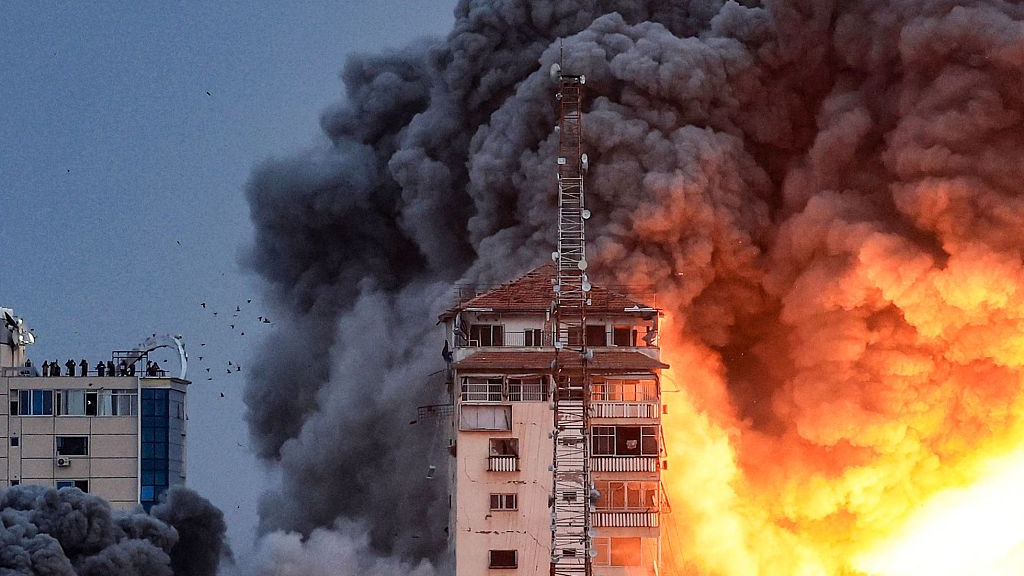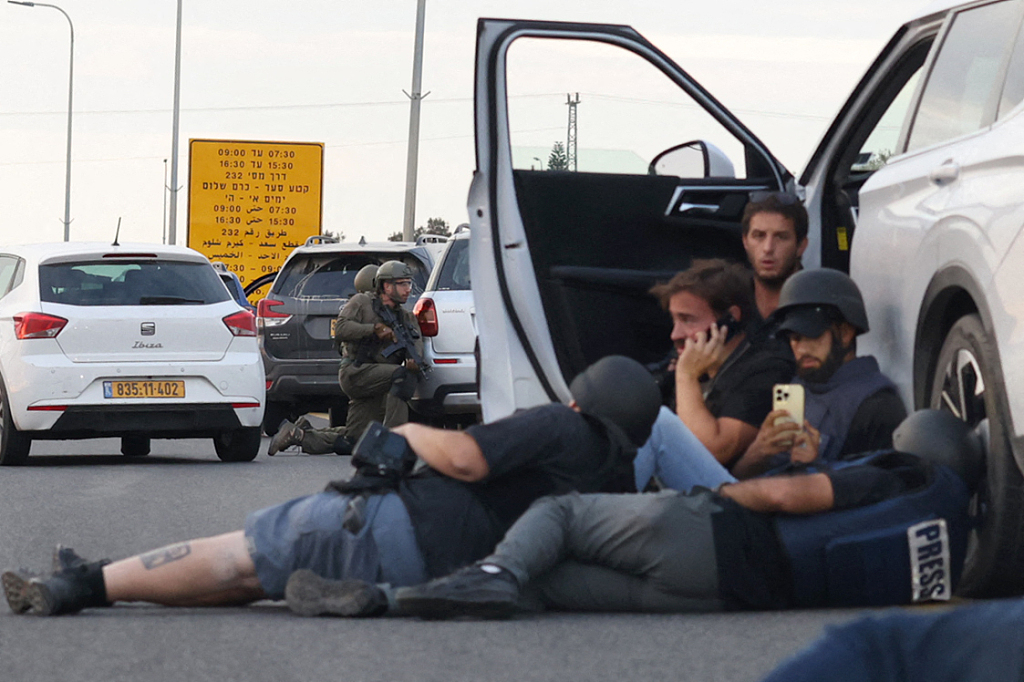
People standing on a rooftop watch a ball of fire and smoke rising above a building in Gaza, October 7, 2023. /CFP
People standing on a rooftop watch a ball of fire and smoke rising above a building in Gaza, October 7, 2023. /CFP
Editor's note: Wang Jin, a special commentator on current affairs for CGTN, is an associate professor at Northwest University of China. The article reflects the author's opinion and not necessarily the views of CGTN.
Five decades after the Yom Kippur War in 1973, which began with a surprise attack on Israel by Egypt and Syria, the Islamic Resistance Movement (Hamas) and the Palestinian Islamic Jihad in Gaza have launched another surprise attack on Israel. The new round of Palestinian-Israeli conflict has shocked the world with an intense barrage of rockets and raids.
This round of clashes has shattered Israel's "solid defense" mentality. Israel has always promoted the idea that Hamas in Gaza poses a limited threat to Israel and that it can intercept rockets through air defense systems such as the Iron Dome and combat illegal border crossings and underground tunnels from Gaza to southern Israel through intelligence monitoring.
However, after the outbreak of the conflict, not only was it difficult for the air defense and interception systems to withstand the saturation rocket attacks, but the interception of infiltrators in Gaza was also ineffective. Israel's national emergency services agency Magen David Adom indicated that at least 250 people have been killed and 1,500 injured in the conflict, the worst attack in Israel in decades. The capture of an unknown number of Israeli civilians and soldiers into Gaza by Hamas militants is a very sensitive issue for Israel.
This round of conflict will disrupt the reconciliation process between Saudi Arabia and Israel. Under the force of the United States, the Saudi-Israeli relationship may have taken a new turn. Before the outbreak of the conflict, it seemed that Saudi Arabia and Israel were on the verge of normalizing their relations. In an exclusive interview with the U.S. media Fox News aired in September, Saudi Crown Prince Muhammad bin Salman said that a breakthrough in Saudi-Israeli relations was imminent. "Every day we get closer," he said in the interview. Israel has also been optimistic that bilateral Saudi-Israeli relations may be on the verge of normalization.
However, this goal has in fact broken the principle of "Palestinian-Israeli peace before Arab-Israeli peace" insisted on by Saudi Arabia. As a leading Arab country, the normalization of relations between Saudi Arabia and Israel will inevitably lead to the launch of contacts between a number of Arab countries and Israel.
Recently, Hamas and Jihad in Gaza have held a number of large-scale rallies against the normalization of Saudi-Israel relations. This conflict is likely to be an extreme reaction of the Palestinian armed factions against the normalization of the relationship between the two countries.

Journalists take cover behind cars as Israeli soldiers take position during clashes with Palestinian fighters near the Gevim Kibbutz, close to the border with Gaza, October 7, 2023. /CFP
Journalists take cover behind cars as Israeli soldiers take position during clashes with Palestinian fighters near the Gevim Kibbutz, close to the border with Gaza, October 7, 2023. /CFP
In Israel, the Yom Kippur War in 1973 led to a deep reflection on the relationship between security and war, and further led three former Israeli prime ministers, Golda Meir, Yitzhak Rabin and Menachem Begin, to enter into a dialogue with Egypt, culminating in the United States-brokered Camp David Accords with Egypt in 1978, which led to the end of the state of war between Israel and Egypt.
Currently, Benjamin Netanyahu is also facing enormous pressure from the Israeli domestic public opinion. On the one hand, at the beginning of the attack, Hamas fired more than 5,000 rockets in an hour, and such a large-scale military activity wasn't detected by the Israeli intelligence agencies in time. On the other hand, a large number of Palestinian militants from the Gaza Strip crossed the border into southern Israel to launch an attack. The Israeli patrols and camera probes also failed to detect in time, resulting in huge casualties.
More importantly, Israel faces military threats not only in the south from Gaza, but also in the north from Lebanon's Hezbollah and pro-Iranian militant groups in Syria, and in the West Bank from emerging militant groups in towns such as Jenin and Nablus. How to ensure that the long borders won't be breached in the future? And whether Israel is as "secure" as it claimed to be? Facing the questions, the confidence of the Israeli public in the security of the country is bound to be challenged.
In the current round of the Israeli-Palestinian conflict, although the armed factions in Gaza, represented by Hamas and Jihad, have the upper hand, in the future, Israel's counter-attack is bound to cause more casualties among Palestinians in Gaza. In the coming days, the good offices of Egypt and other countries will be crucial to peace, but the huge casualties, the Israeli hostages, and the shattered political confidence of Israel will become new scars on the Palestinian-Israeli issue.
As the longest-serving Israeli prime minister since the founding of the country in 1948, Netanyahu has always been a self-proclaimed "Mr Security," but the Hamas military operation shows the failure of the Israeli security apparatus under Netanyahu's leadership. The conflict is bound to put a serious dent in Netanyahu's political popularity in Israel, and a special commission of inquiry is likely to be set up after the conflict to investigate the Netanyahu government's failures. Already impacted by the corruption scandal and judicial reform storm, I am afraid that it will be difficult for Netanyahu to survive a new round of political turmoil in the future. But this conflict, as in the case of the war 50 years ago, is likely to push public opinion in Israel to reflect.
Years ago, I attended the annual meeting of the Israel Institute for National Security Studies, where the famous Israeli left-wing writer David Grossman said that "Israel is now very strong and secure, but philosophically speaking, no party can always be strong, and security is bound to have loopholes." The Israeli-Palestinian conflict is likely to prompt Israeli society to rethink its policy on the Israeli-Palestinian issue, and it may also bring new opportunities for Israeli-Palestinian peace.
(If you want to contribute and have specific expertise, please contact us at opinions@cgtn.com. Follow @thouse_opinions on Twitter to discover the latest commentaries in the CGTN Opinion Section.)